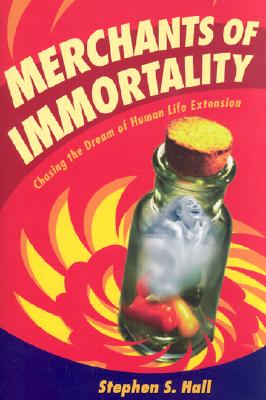

| MERCHANTS OF IMMORTALITY Chasing the Dream of Human Life Extension Stephen S. Hall Boston: Houghton Mifflin, 2003 |
Rating: 4.5 High |
|||
| ISBN 0-618-09524-1 | 439pp. | HC | $25.00 | |
It is easy to take the advances of twenty-first century medicine for granted, forgetting how recently poliomyelitis, for example, doomed thousands of American children to life in a machine that did for them what their chest muscles could no longer do: bring air into and out of their lungs. Being trapped in this "iron lung" was no fun, but at least it extended lives that would otherwise have ended painfully. But now, every American can be free of polio and many other once-devastating diseases, thanks to vaccines. These and other "medical miracles" have in a sense prepared us for the next advances.
"Because we've done such a spectacular job of minimizing the agents of premature death — diseases, accidents, poor hygiene, injuries, not to mention predation, starvation, and exposure — we are living so long that aging itself has only recently emerged as a subdiscipline of medicine. In a sense, we didn't even know aging existed as a biological phenomenon until we started living well beyond reproductive age, which is really all that evolution is interested in protecting. Now that we know aging exists as a separate, degradative phenomenon, and are beginning to understand it, we naturally want to see if we can tinker with the process. That is what we do, and that is what I have set out here to chronicle: an account of some of the people who have begun to revolutionize medicine's assault on aging, and the type of science they are doing. Inevitably, my encounters have also led to a cultural contemplation of what it might mean to us, as individuals and as a society, to repeal, even partially, the laws of mortality." – Page 4 |
Development of vaccines against viral diseases requires living cells, because the viruses will only grow in host cells. But in the early 20th century vaccine development was plagued by impure cells; every human body is contaminated by a zoo of wild viruses. The human embryo, however, is pristine.
That is where Hayflick came in. Working at Philadelphia's Wistar Institute in 1958, he became an expert at culturing human fetal cells and soon was supplying laboratories all over the world. Then he noticed something odd: certain cells stopped growing for no apparent reason. He soon discovered that normal cells have a sort of timer; after dividing a fixed number of times, they stop dividing and undergo apoptosis, or programmed cell death. This number, typically 50, became known as the Hayflick limit. Researchers soon found a way around it.
They showed that "old" cells, with shortened telomeres after many cell doublings, could be rejuvenated in a lab dish when biologists introduced the immortalizing enzyme. – Page 152 |
Now we know that apoptosis results from the shortening of those chromosome caps called telomeres, and we know how to lengthen them again. But we also know that this is not the key to prolonging human life. Microbiology is rarely simple.
Although not well known among the larger public that will instantly recognize the names of Will Smith, Scarlett Johanssen or Brad Pitt, Leonard Hayflick is a household name — even an elder statesman — among medical researchers.1 He pioneered the culturing of cell lines that are used in manufacturing vaccines today.
In a real sense, this narrative revolves around Hayflick and a younger man who, early in his own career, made a pilgrimage to visit him: Michael West. After college he became a creationist, but was cured by the science bug. He went on to found Geron and later Advanced Cell Technologies. Each company is dedicated to unraveling an aspect of the riddle of cell death and thereby to develop treatments that will repair organs or cure degenerative diseases like Alzheimer's or multiple sclerosis. And each has run into the barriers that frustrate such efforts in America today: the complexity of the actual science, and the obduracy of religiously-motivated political opposition to the research.
Hall has delved deeply into both aspects of the struggle. I think it is fair to say that each deserves a book of its own, and Hall weaves them together here in ways that distract the reader. The narrative jumps around in time, for one thing. While this is to some degree inevitable, when combined with the huge cast of characters (also inevitable, because true to life) and the day-to-day temporal resolution of the account, it makes the threads very hard to follow.
The situation improves when the reader arrives at Chapter 14. From here through Chapter 16, Hall focuses on the political battle and does a very thorough job of describing how it progresses through memoranda and conferences, lawsuits and countersuits, until it culminates in the speech by George W. Bush on 9 August 2001. This was the speech in which Bush, after what was portrayed as lengthy soul-searching, restricted federal funding for embryonic stem cell research to 60 pre-existing lines. The members of the American scientific community were delighted, some for as long as 48 hours. By then it was clear to all that the number of useful lines was far lower, and that the decision effectively ended research on embryonic stem cells in this country.
To sum up, I would say this book is well worth reading. Hall writes clearly and gracefully, and makes a miniscule number of errors for a book of this length. However, the sheer abundance of detail makes it somewhat hard going, and the intermixing of scientific and political threads makes both harder to follow. Is it a keeper? Only for dedicated historians of medical science, I think.

 To contact Chris Winter, send email to this address.
To contact Chris Winter, send email to this address.